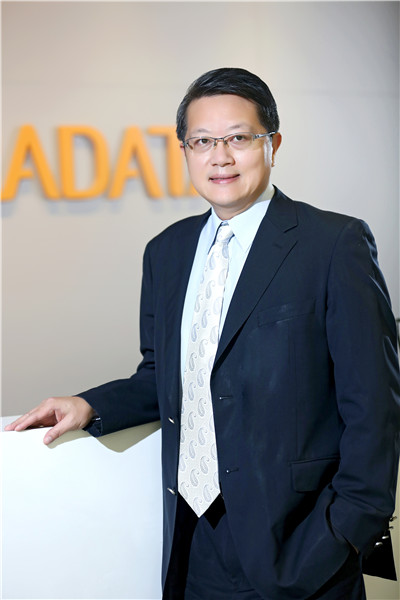 |
|
Aaron Hsin, president of Teradata Greater China Area.China Daily |
Six years on, chief of Teradata's China unit reviews the company's show as well as his own performance
Asked about his work over the past six years, Aaron Hsin, president of Teradata Greater China Area, thought for a moment. And then some. It appeared he had much to say about his work and his employer.
"I really appreciate Teradata's corporate culture and the company's atmosphere of cherishing talents," he said finally.
During a recent interview in Beijing, he said he is now leading a 1,000-plus team at the China unit of the international software company that provides big data and analytic data platforms, marketing applications and related services.
The company's revenue has quadrupled in the Chinese market since he joined it in 2010. He credits that partly to the university education he received in the United States about 30 years ago.
Hsin received two master's degrees: one in computer sciences from Stanford University and another in information management from the State University of New York. Both the degrees have helped him to serve two US software companies-Microsoft and Teradata-well in Beijing for 14 years, he said.
"Of course, there is also a cooperative, talented, supportive team, and my passion for the tech work I do."
Working with Microsoft as a senior manager and now at Teradata, he said, gave him opportunities to use his knowledge for China's economic development. "At the same time, I've built close links with many industrial experts and made many friends here."
He is now a member of the China Big Data Expert Committee and the China Cloud Computing Technology & Industry Alliance under the Chinese Academy of Sciences.
Owing to downward pressure exerted by a feeble global economic growth recovery, Teradata's full-year global revenue for 2015 fell 7 percent to $2.53 billion yuan.
But Teradata's business in China has seen unprecedented growth, according to Hsin. He, however, declined to disclose the China unit's financials.
"The decline in Teradata's global revenue had nothing to do with the slowdown in China's economic growth. On the contrary, I saw greater market demand in the Chinese market for our data warehousing and analytical products," Hsin said.
He said he saw increasing business opportunities in China for analytical products of cross-industrial sectors. For example, Teradata's market research found products that can monitor both manufacturing and marketing at the same time are needed.
So, the company is studying its customers' plans to develop such products as soon as possible so that the enterprises could innovate, he said.
Tony Baer, a senior analyst with Ovum, a market-leading research and consulting business focused on convergence of IT, telecoms and media markets, said the value of Teradata's products comes from 40 years of experimental experience. The products help customers deal with data management and see business values in these data set in different environments.
"Teradata has proved its passion by doing only one thing, the data analytical product, for over 40 years," Hsin said. "So, I am deeply affected as a member of the company. My passion at Teradata encourages me to lead my team to achieve one business success after another in the Chinese market."
Hsin said his team once achieved double-digit revenue growth for three consecutive years. Positive growth over six consecutive years is another feather in its corporate cap.
Teradata's analytical products have helped its enterprise customers greatly improve their business, he said. For example, a leading Chinese telecom operator which is a client of Teradata's analytical products, is providing well-processed data service for a local banking institute to decide where and when it needs to set up new branches in China, said Geoffrey Jiang, GCA regional solutions director of Teradata Information Systems (Beijing) Ltd.
Many Chinese banks used to hire consulting businesses for feasibility studies before opening branches in remote areas. Typically, such studies took several months to complete. Now, with analytical data, the institute needs only two to three weeks before it gets the solution.
As for Teradata's future development in China, Hsin said: "We are not afraid of competition but we prefer cooperation."
Before he joined the company, Teradata's customers were mainly from three sectors: communications, financial services, and internet. Now, it has built a customer base involving about 12 industrial sectors across the country with new clients coming from many industries including manufacturing, automotive, retail and insurance.
"Teradata has not only engaged its cooperation deeper with top-ranked State-owned companies but is also growing its customer base in the country's booming private business sector," Hsin said.
Along with China's fast-growing e-commerce, Teradata is cooperating with many business-to-customer and business-to-business websites, including eBay Shanghai and a local leading e-commerce company.
"Now, we are working on introducing our advanced cloud computing technology to the Chinese market. Through cooperation with our software development partners, we are expecting to have a formal announcement in this development later this year," Hsin added.
According to a recent Teradata report, the US now contributes 60 percent of the company's annual revenue, with the remainder coming from other markets.
Data analytical products make up 42 percent, while consulting and other services account for 58 percent of revenue.
Teradata now has more than 2,500 corporate customers worldwide. For example, it has been helping a growing number of utilities analyze the vast amount of data produced by their "smart" meters and power grids, which can help increase company efficiency and reduce customer costs, officials said.
CLOSE-UP
Aaron Hsin
President of Teradata Greater China Area
Born in Taiwan
Education:
Master of Computer Sciences, Stanford University. Master of Information Management, the State University of New York
Career:
Hsin has around 30 years of work experience, and is now also a key member of the China Big Data Expert Committee and the China Cloud Computing Technology& Industry Alliance. He once served as the Microsoft Greater China General Manager of Microsoft Enterprise& Partner Group business before joining Teradata as president of Teradata Greater China Area in 2010.
